11 Reasons Your Car Shakes When Accelerating (and How to Fix)
Does your car shake or vibrate when accelerating? This symptom likely signals a simple but often serious issue.
Let’s look at the most common reasons your car is shaking when stepping on the gas, how to narrow it down, and ultimately fix it.
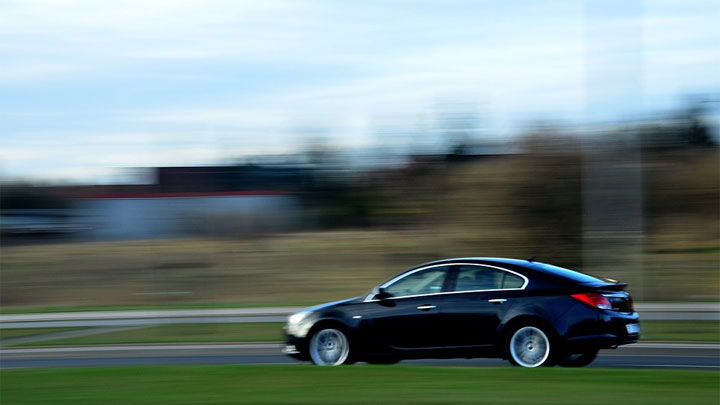
See Also: Car Making a Rattling Noise When Accelerating? (Here’s Why)
Common Causes of Car Vibration When Accelerating
If your car is shaking when you accelerate, it can be a frustrating and potentially dangerous experience. Here are some possible causes of car shaking:
#1 – Damaged Inner CV Joint
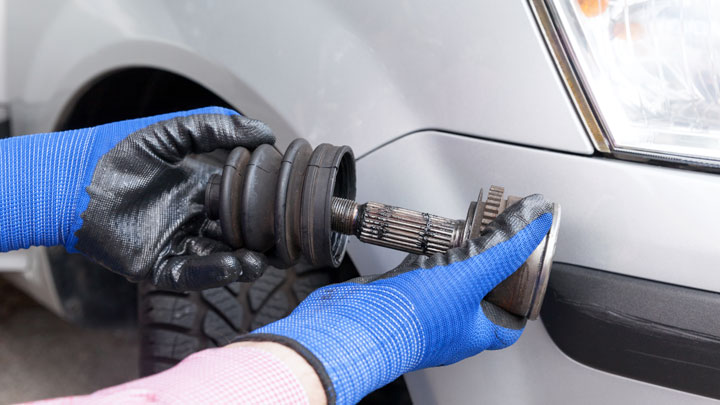
CV joints are located at the end of each axle. There is both an outer and inner joint. When the inner CV joint is damaged or begins to fail, you will notice your car vibrating under hard acceleration. As it gets worse, the minor vibrations turn to violent shaking when under load.
Damaged CV joints usually occur because of a tear in the joint boot. When this happens, water and dirt get inside the boot and contaminate the grease that protects the splines inside.
Without proper lubrication, the metal on metal contact eventually causes failure. The only fix is to replace the CV joint or the entire CV axle.
#2 – Broken Motor Mounts
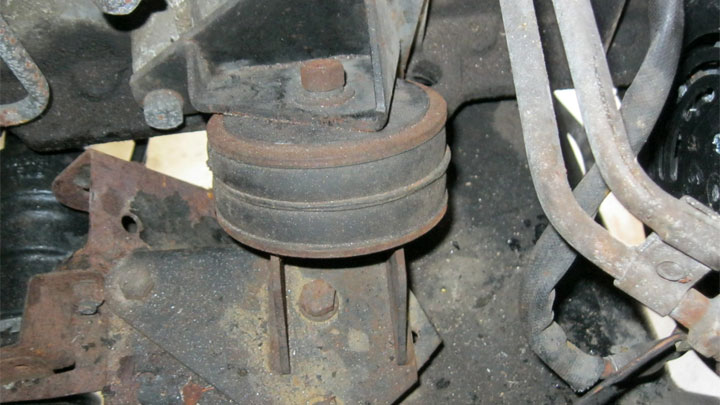
The main purpose of motor mounts is to attach a car’s engine to the frame of the vehicle. A secondary purpose is to dampen or reduce engine vibration so the occupants of the car don’t feel the constant shaking or vibrating of the engine while it’s running.
Engine mounts are made of a hard rubber material which allows them to absorb these vibrations. When a motor mount is damaged or broken, not only will you feel excess vibration in the car, other parts in the engine can get misaligned and ultimately break since the engine is not in its precise location.
You will be able to feel a bad motor mount when idling but the shaking can be more obvious under acceleration as the engine has to work hard. Replacing a bad motor mount should stop the vibrations.
Keep in mind that when a motor mount is broken, the other mounts now bear more of the load and are more likely to fail as well.
#3 – Unbalanced Tires
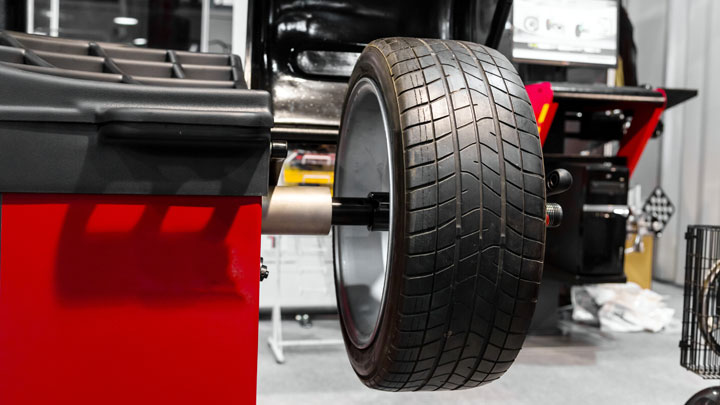
If you recently had new tires installed and notice your car shaking while driving, it may be the result of unbalanced tires. When at tire is mounted on a wheel, it will never have the exact same weight all the way around.
To fix this, a tire installer will mount the tire/wheel assembly on a balancing machine and stick on small wheel weights to the rim at specific locations to make the balance perfect. As a tire rotates, any slight weight imbalance will turn into a small vibration.
At higher speeds where the tire is rotating much faster, the vibration will be more noticeable and your steering wheel will actually shake.
If your car vibrates while at a constant speed and is worse at higher speeds, you may have an unbalanced tire(s). It’s also possible one of the adhesive wheel weights simply fell off. To fix, simply take your car back to the tire shop to have them rebalance the tires.
See Also: What is Tire Cupping?
#4 – Loose Lug Nuts
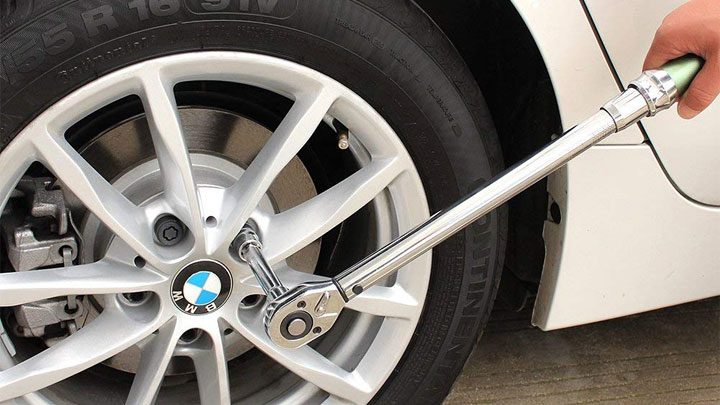
A simple problem (more common than you think) that could become catastrophic. If the lug nuts on a wheel were not properly torqued down on the hub and some loosened over time, the wheel would have a slight wobble to it. While driving, this would make it seem like the car was shaking.
If left untightened, the lugs could eventually loosen all the way out and your wheel could actually fall off while driving. Suffice to say, you don’t want that happening. Don’t overlook making sure that you’re using the correct lug nut size as well.
To confirm you don’t have loose lug nuts, use a torque wrench to make sure each lug nut is tightened to proper factory specs. If you don’t have a torque wrench, a regular lug nut wrench or tire iron can be used for tightening
#5 – Bent Driveshaft
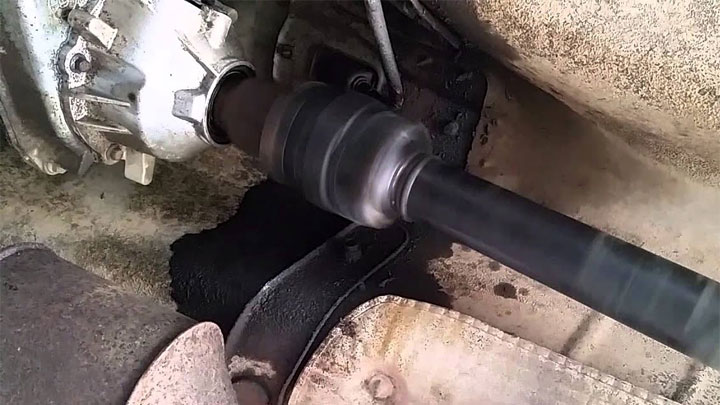
If your car has rear wheel drive (RWD), power from the engine to the rear axle and connected wheels is delivered through the driveshaft (or propeller shaft).
Therefore, if the driveshaft is even slightly bent or damaged (often due to an accident), it will cause the car to shake when accelerating at low speed and get worse as you go faster.
Since you normally can’t repair a driveshaft, replacing it is the only option.
#6 – Bent Axle
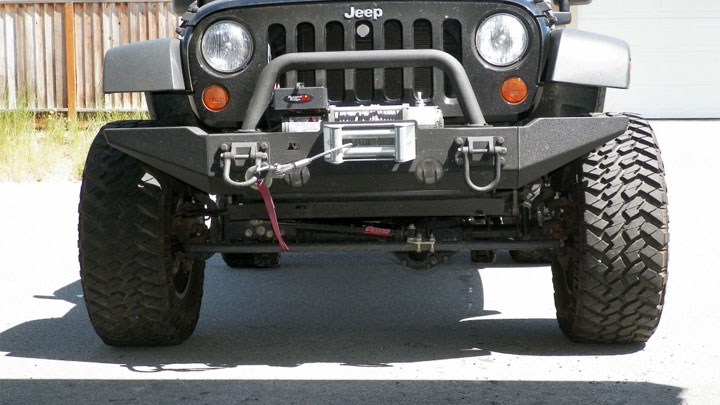
If you accidentally drive curb, large rock, or have some kind of minor accident, don’t assume everything is fine if you don’t see any noticeable damage. The incident could have caused an axle to get bent, which is serious.
You will start noticing vibrations coming from the car which starts to get worse as you accelerate the car. Similar to the driveshaft, you will need to replace a bent axle immediately or risk causing further damage.
See Also: What Causes “Death Wobble”?
#7 – Stuck Brake Caliper
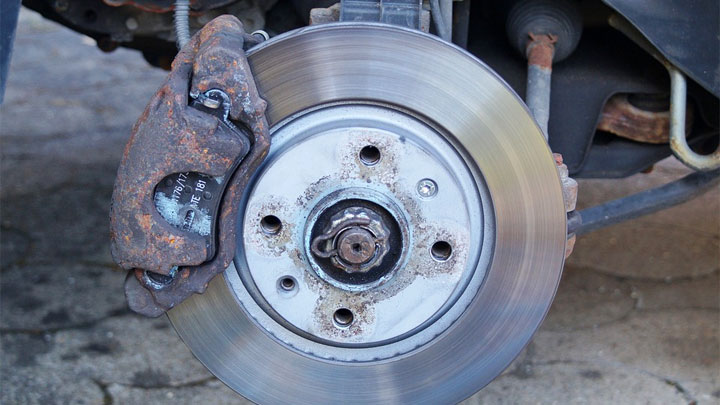
If the brake caliper on a wheel is faulty and causing it to stick, then it can cause brake shudder and other car vibrations. In this particular situation, the steering wheel will be what vibrates as you reach about 40-50 miles per hour.
The vibrations will get worse as you continue to accelerate at higher speeds. When you come to a stop, you will likely notice a burning-like odor coming from the vehicle.
If you suspect a stuck brake caliper, you should be able to figure out which wheel it’s at using your nose due to the smell. You will need to inspect all parts of the brake system there paying particular attention to the caliper bolts, slides, and piston.
Sometimes cleaning and re-lubricating the parts is all that’s needed but failed brake components will need to be replaced.
See Also: Causes of Grinding Noise & Vibration When Braking
#8 – Torn or Disconnected Vacuum Hose
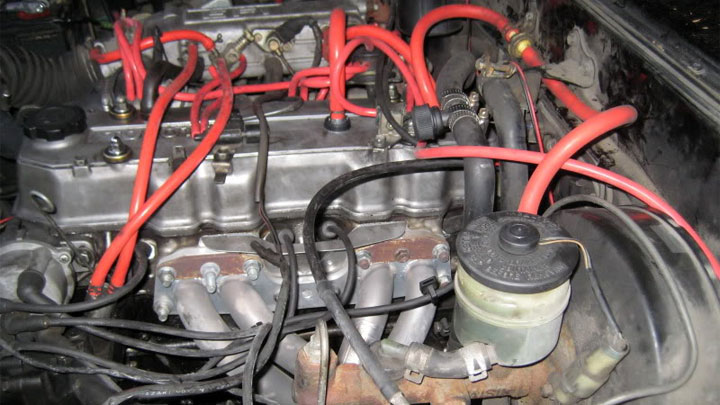
This common problem can cause severe shaking or shuttering of a car while driving. If a vacuum hose becomes disconnected or develops an air leak due to a small tear, the lack of air pressure can cause various sensors to get confused which in turn can lead to misfires, backfires, losing power, and other problems where the engine doesn’t run smoothly.
Inspect all hoses to make sure they are connected to somewhere and they have not tears or cracks in them. You may need to use a small clamp to reattach hoses that are too loose on the fitting.
Vacuum hoses on turbocharged cars are even more prone to disconnecting. Replacing with stronger silicone hoses is commonly done as a permanent solution.
See Also: 6 Reasons Why the Check Engine Light is Blinking and Car Shaking
#9 – Dirty or Worn Spark Plugs
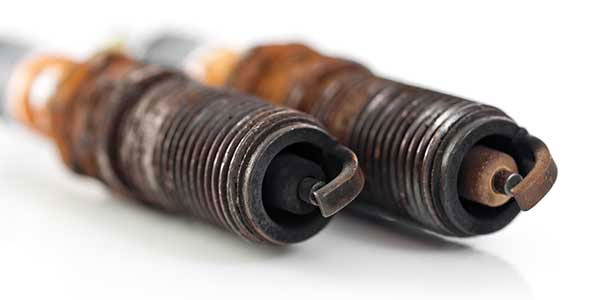
Spark plugs that are dirty or fouled up can cause the engine to misfire. While the problem is usually first noticed when at a stop, it may also make it seem like the car is vibrating when driving.
If you don’t remember the last time you replaced your spark plugs, it may be time to do so. If you remove one and notice a bunch of dark buildup on the tip, there’s good chance the rest of your spark plugs are bad as well.
#10 – Suspension Issues
The suspension system of your car is responsible for keeping the wheels in contact with the road, providing a smooth ride, and absorbing shocks. If there’s a problem with your suspension system, you may experience shaking or vibrations when you step on the gas.
Some common suspension problems that can cause your car to shake and vibrate include:
- Worn Ball Joints – These are the pivot points between the suspension and the wheels. If they wear out, they can often cause your car to shake.
- Worn Wheel Bearings – These are the bearings that allow your wheels to rotate smoothly. With bad wheel bearings, your car will definitely start to shake, especially at higher speeds.
- Damaged Shocks or Struts – These are the components that absorb shocks and keep your car stable. If they are damaged or worn out, expect your vehicle to shake.
#11 – Death Wobble
Death wobble is a violent shaking of a vehicle’s front end that can be caused by worn-out steering or suspension parts, improper tire inflation, or other issues. It affects various types of vehicles, most notably trucks, SUVs, and Jeeps.
If you experience death wobble while driving, it’s important to slow down and pull over to avoid a potential accident. A mechanic can diagnose the issue and provide a solution to get your vehicle back to safe driving condition.
How to Diagnose Car Shaking

If you’re experiencing shaking or vibration while accelerating, you’ll want to diagnose the issue before it becomes an even bigger problem. Here are some steps you can take:
Visual Inspection
The first step is to visually inspect the vehicle. Check for any visible damage or wear on the tires, suspension, and steering components. Look for any loose or broken parts, and check for leaks or other signs of damage under the hood.
Test Drive
Once you’ve completed a visual inspection, take the vehicle for a test drive. Pay attention to the type of shaking you’re experiencing, as well as the speed and intensity of the vibration.
Is it come from the front or rear of the vehicle? Is it more noticeable at low speeds or high speeds? Does the shaking increase in intensity as you accelerate? Does your vehicle only shake and vibrate on certain roads?
All of these questions can help you (or your mechanic) find the root cause.
Computer Diagnostics
If you’re unable to determine the cause of the shaking through a visual inspection or test drive, it may be necessary to use computer diagnostics to pinpoint the issue. A mechanic can use a diagnostic tool to read codes stored in the vehicle’s computer system and identify any potential issues.
Remember, if you’re unsure about the cause of the shaking or don’t feel comfortable performing a diagnosis yourself, it’s always best to take your vehicle to a trustworthy mechanic for a professional inspection.
- Replace the Engine or Replace the Car? (11 Factors to Consider) - Apr 11, 2024
- Plastic Piece Dragging Under Your Car? (What It Is and What To Do) - Mar 21, 2024
- Timing Belt vs Timing Chain (What’s the Difference?) - Feb 27, 2024

I have a 2005 Toyota Highlander. The car shakes when driving. I feel the shaking in the driver’s seat. The steering wheel does not shake. It gets worse the faster I go. When I let off the accelerator, the shaking stops. When I press on the accelerator, the shaking resumes. It gets worse at speeds 55 and faster.
Could be your driveshaft or a u-joint. It could also be the differential, but I suspect it’s something related to the driveshaft, particularly if it’s something you only feel in the seat and not the steering wheel.
If the driveshaft comes loose, it will likely leave you stranded and possibly do some damage to the underside of the vehicle. I’d get that taken care of as soon as you can.
I get the vibration between 40-50mph in my Mercedes’ Citan Duoliner – just had the drive shaft replaced as the cv boot was leaking on the drivers side but it’s made no difference – anyone found a solution to this vibration when accelerating at a certain speed?
Have you checked the tire balance? Sometimes wheel weights come off or the tires need to be rebalanced over time.
I have the same issue. Got my transmission replaced, but after a couple of months it came back.
I drive a 2014 Honda CR-V. My steering wheel vibrates whenever my car speed is between 30-40 mph. Once past 40 mph, the vibration stops completely. While most explanation mentions about bad CV joint, motor mount, loose lug nuts, unbalanced tires, stuck brake caliper, etc but it doesn’t address the issue as to why it only vibrates between 30-40 mph and not before or after. It is very steady even from 60 mph and beyond.
Those are good suggestions. Hard to say why you only feel the vibrations in that speed range, but the question might be easier to answer once the root cause is found.
When i drive and let off acceleration i feel like the engine is shaking..happens only sometimes.. Throttle body cleaned, still its same, Changed the spark plugs and still its same..also there is no engine light on..Tried to figure it out unfortunetely nothing, Any suggestion..by the way the car is a Nissan Note DBA E12 1.2 Engine
Any chance your motor mounts could be bad? Generally when your engine shakes as you let off the gas, it’s because of bad mounts. The engine rocks back and forth as you give it gas and let off the gas pedal. If your engine mounts are bad, it should shake worse when you jump off the gas pedal quickly, as opposed to letting off slowly.
My nissan note new model is shaking alot when in jam.
What could be the issue
What do you mean “when in jam”?
I would look at engine mounts…CV axles if any..sub- frame bolts depending on age can loosen over time
Did you ever find the solution? I’m having a similar issue as well
My Toyota Avalon 2008. I feel the vibration on my gas pedal on low speed only. At idle the car is completely silent. On freeway I feel the vibration on floorboard and lower part of the steering . I have new CV axle, engine mount are new oem. My rear shocks are new, I road force the tires also, I did wheel alignemnt, the control arms are new.there is exhaust leak also. With all these I still feel the vibration mostly on my gas pedal during acceleration. Now I feel like I need to get new shock assembly for my front tires and may be get a new tie rod install.
Check your hubs, tie rods, axle nuts, and lug nuts. Are you feeling this vibration through the steering wheel as well?
Hello everyone. I drive a 2004 Toyota Solara. A few days ago, I came here seeking help. My car was shaking while accelerating and it shook more going up hills and going 30mph or faster. The shaking sounded like it was coming from my passenger tire, but I could feel it in my steering wheel. I eliminated the tires needing balanced because I got new tires the day after the shaking started and got them balanced. (my tires were bare and I had to get some anyways so I just had them balanced then).
I noticed that no one else posted a solution so I’ll give you mine in hopes this helps you. I looked at another site that said it could be my top motor mount. When I popped my hood, sure enough it was cracked and failing. I looked up a YouTube video for ways to test before I bought a replacement and when I tested it my engine shook like crazy/made a bunch of noise. Get a friend to help you test it if you need to!
I can’t say it would be easy to fix for other cars, but mine was. Two bolts out, swap the old part, put the two bolts back in. I almost thought it was too easy of a fix for such a annoying and scary issue. Depending on where the motor mounts are on your car, this could be a more difficult fix. But please check it and eliminate it before you run to a mechanic. The replacement was $30 and I installed it myself. If a motor mount is an issue and you ignore it, it WILL cost more money over time because other things will start breaking.
My car is now working like it used to. No more shaking, no other damage under the hood, and no serious damage to my wallet. I hope my comment helps some of you out.
I’m glad you got it sorted, and I’m glad you were able to fix the issue yourself. Many motor mounts are more difficult to install because they sit underneath the motor. Many of these designs require you to jack up the engine while you replace the motor mounts, and should be done carefully because motors are very heavy (weighing 500 lbs or more).
Too bad it did not have a name
I have a very similar problem on my car.
The car is shaking when the RPM is between 1000 – 1500. When the RPM is out of that range, it doesn’t shake at all.
What is the problem? And why it vibrates only at that range of RPM?
How much throttle are you giving it in the 1000 to 1500 RPM range?
I applied full throttle.
Don’t apply full throttle at low RPM like that. It’s not good for the engine, and it’s called “lugging the engine” when the car shakes like that. Downshift first, then accelerate.
Thanks for your advice, Sean. You are so kind and willing to help.
Happy to help!
I just get new clutch and put new gear box in kuga 4 weeks ago was driving home when I put the accelerate down its stats to shake but when I take it out of gear it dos not shake do u think it could be the clutch again
Could be. Did you tighten all of the pressure plate bolts according to spec? It’s very important to use a torque wrench (and even a bit of loctite) on these bolts so they don’t back out. The same is true with flywheel bolts.
It might be a good idea to go back in and just make sure everything is seated correctly with the clutch assembly.
My 2011 e350 4matic (276,000 miles) does that shudder shake. I had a complete tune up, all new tires put on, drive shaft replaced, tires rotated…… I think I’m going to have them rotated back how they were because it got worse after the new tires. I did have to take it back and get the tires rebalanced though and maybe that made it worse. I don’t know. Like you all, I am just trying to find a mechanic that can help me.
I have a problem with my toyota auris 1.4 diesel automatic . My car runs normaly during gear changes and runs fast and smooth but my problem with the cars is that when i pres the breakes during the low gears 2nd or 1st my car shakes heavily like the engine is about to turn off. what am i dealing here what is the problem with my car is it breaks issues ?
Is the car shaking like the idle is low and it’s going to stall? Does it feel like the shaking is coming through the brake pedal instead?
My Camry 2008 also vibrates while accelerating at 50mph to 70mph, it shakes and vibrates while trying to gain speed, but after 70mph it barely shakes or should i say shaking is reduced. Went to the mechanic he said i should go check my newly replaced front tires, changed them again yesterday, though am yet to test run it on the highway
. Any similar fix should be discussed here please
I’d have the shop check to make sure the new tires are balanced correctly. It’s also possible a wheel weight fell off.
Will do and advise.
I have a VF Calais V 2014. It has developed this slight shudder when driving – but only when I accelerate – between 50-80 kph. No noises when idling or starting. No shudder/vibration on cruise at higher speeds.
It is not a constant thing – only when I have to regain speed – and only a short time – 10/20 seconds ?
Doesn’t seem to occur at lower speeds. Engine looks/sounds ok – ie no undue vibration/noise etc. No leaks etc.
It feels like a momentary (10-20 metres max) stretch of rutted roads. Very short time and goes after I’ve accelerated.
I wondering if this could be knocking or misfires? If you pull the spark plugs, how do they look?
Am currently experiencing the same in my Nissan Tiida, its hectic considering my mechanic cannot figure the cause
Can you describe the shaking? When is it present? Does it get worse with greater engine or ground speeds?
My VW Passat front wheel drive, manual transmission shakes a bit when accelerating between 40 – 60 mph or so and only then. Replaced front tires, replaced spark plugs, engine mounts looks solid. Also replaced passenger side axle which had a broken outer CV boot. But the shaking is still there. Frustrated and out of ideas. Some others reported the same issue but unfortunately never added to their comment what fixed their problems.
Who replaced the axle? I would spend the $100 or so it will cost to have a shop diagnose the issue. Shaking can be indicative of a more serious problem such as loose suspension parts, a loose tie rod end, or a loose wheel.
My Corolla shakes when am accelerating
Is the check engine light on?
I have a 2009 Mitsubishi Strada 4×4 with 4 inch lift kit with 34 tires. We experienced the whole truck vibrating at 60 kph or about 40 mph. Brought to dealership n they disconnected my racing chip stating they believe that could expand the injectors and cause the vibration so they disconnected my chip. We brought it home and it was not vibrating any longer. Next day we set out again to make our trip but again at 60 kph the whole truck started to shake so we pulled into a station and I noticed the 4×4 light flash. I put my hand on the 4×4 lever then backed up and felt and heard it come out of 4 wheel drive. Now I could not tell it was in 4 wheel drive and I have driven them for years so know how different it is specially when turning wheel 100% to one side or other and we did this leaving our garage and it was not in 4×4. We headed out on the road and it drove fine for about 5 months and now it shakes again and the light is blinking or on fully or off fully. Could it be stuck in the middle of going into 4 wheel drive and get there on its own? I did find a vacuum hose broke and cut it and was barely long enough to replace. The steering wheel does not shake but the dashboard shakes and the money and items around the truck shake and rattle at 60 kph. Please any help will be appreciated cuz cannot find anyone here that knows much about 4×4 syxtems on vehicles. God Bless
My car like bounces when I let off the gas and when accelerating at higher speeds. Recently heard the cv joint pop so I figure that’s the issue? Any input would help.
It could be the motor or transmission mounts. If either of those are shot you will often get a lot of powertrain movement. Those should be easy for a mechanic to visually inspect if you end up bringing the vehicle into a shop.
I just bought a 2008 GMC Acadia on a lot as is. It’s my first time buying from a lot and the guy told me that the only thing wrong was I needed a new amplifier for the radio system. Well when I test drive it it ran and drove just fine. No issues. Upon driving it for a few hours off and on and once in stop n go traffic it started to shake when I would accelerate starting at 25mph if I let off the gas it stops. Then I accelerated and the rpm went way high then my rpm, battery and mph gauge all went all the way down then a check engine light came on. I pulled over and turned the car off and on and the light went away and I could drive it home? Any ideas? We’ve tried seafoam today and were going to do a tuneup this weekend. If issues still persist I need a professional I know but if someone could help save me from being ripped off from a mechanic telling me it’s a million things when it’s only one that’s be helpful too! Thank you!
This is a wild guess, but maybe you’re having an issue with the ignition coils. That could cause misfires (which would vibrate the car) and could mess with the tachometer. Get the codes read, that will narrow down the scope of the problem considerably.
There could also be an electrical issue somewhere. I can’t think of why the shaking would cause the gauge cluster to die like that. More troubleshooting is needed before anyone can say definitively what’s wrong with it.
My wobble is on the front right side. Most noticeable when accelerating from a stop or when turning left. Goes away when reaching 40 MPH or more or when my foot’s off the gas. Started after replacing both all four motor mounts, lower control arms & ball joints, Struts and Sway Bars and CV axles (2004 Toyota Highlander FWD). Replaced right axle (again) in hopes of a fix…didn’t work. Bought new tires that were balanced prior to install and a front wheel alignment. Still no affect. Does anyone have a similar situation and did you figure out what the fix was?
How are the wheel bearings?
Did you figure it out. Paid dealer $150 to get that they think it is my front CV Axle. Other mechanics thought it was the rear. Definitely right side because tire cupping occurred on right side. Replacing CV front Axle tomorrow (not at dealer). Already replaced, balanced and aligned tires. 2009 Highlander with 163k miles.
I have an 05 ram 1500 5.7 that’s vibrating between 40-60 mph. I’m going to reset the throttle body to see if it helps since it’s so simple.
It’s probably not the throttle body. Consider having your wheels, tires, and suspension inspected, especially if you feel the vibration most through the seat or steering wheel.
check the calibration of throttle body sensor. If the car’s throttle body is recently serviced, it might be the culprit, shaking on high acceleration
Karl if you have a BMW 740 you should be taking it to have it looked at by someone who knows what they are doing.. Otherwise sell it and get and a small Mitsubishi heap of **** that you can actually change the brake fluid on 🥴
Hi ,
I have a BMW 740 and it Is vibrating after I get 45 miles and beyond and also it is vibrating a lot when I’m Stoping , I feel the car shaking on the front part .
. The car was running very smooth until I change the brake fluid that start shaking for everything , I don’t have a smooth driving anymore .
Can anyone please help me to have an idea what to do,
Hi I have a 2012 Ford bantam 1.3.
I changed all suspension rubbers, new control arms new cv, new shock saddles, new gearbox mounting, put new wheel nuts n got new tyres 13 inch tsw mags, but my van from second gear especially on a right hand bend got a heavy vibration, from 2nd gear up to 5..
Spent a lot of money n the problem is still there..
Please help
Hi am from Mauritius. Recently buy a qashqai j11 1.2 dig-t with 32,000 km. After 5 month driving noise cming from left front wheel and feel little vibration. Check with my mechanic they changed the brake pads the noise gone but vibration still here. It happens only when i reaccelarate after using brake. When i slow down without touching brake it doesn’t happen. What could b z problem. Thanks
I have vibration when i keep at a steady speed. Just keeping my accelerator steady.20, 30, 35 45 just about any speed.
Have a 2016 sienna.
ever figure this out, have similar issue. If I push on the gas it stops vibrating. Only vibrates when not pushing on the gas
I have a 2016 dispatch van and wobbles under pressure but wen you release power it stops
Any ideas
I am only experiencing vibration when accelerating from a stop or during low speeds. I doesn’t happen when above 35mph.
Have u find the problem i have the same problem at the same speed if you fix it can u please lmk what u change ?
I have the same problem did you get the solution
My golf 5TSI is having a same problem I did put in new engine mountings and replaced the dirty plugs but it’s stl shake between 40-50km when it’s reach 70 up it stop
Did you check to see if your wheels are unbalanced, tires are out of round, or wheels are bent? This could cause vibration at certain speeds.
If those look good, I would have the suspension system inspected to make sure it isn’t an issue with a worn tie rod, ball joint, or other suspension component.
Hi, i have the same issue, did you find a solution?
Hello, My Ford explorer has the same problem, noisy engine and hard acceleration from stop, but after a while it will run smoothly without any issue. Kindly share any solution
That’s probably a little too vague for anyone to offer specific diagnostic steps. You’ll want to take it to a mechanic for a diagnosis and see what they say.
What year is your explorer? Are there any check engine lights?
Did it shake only when you accelerated? If so, I have exactly the same problem. It would be so great if you let us know what fixed the problem if you got it fixed.
I’m having the same problem with my Lincoln MKX. But now I’m feeling it in my steering wheel and front tires.
Have a tire shop inspect your tires and check your tire balance. While the wheels are off they may be able to inspect the rest of the suspension to find the problem.
mine too, i changed 2 motor mounts, axel on both sides and still shaking.
Control arm
I have all new motor mounts except transmission mount, could it be causing violent vibration during acceleration?
It’s possible but try to rule out the other causes on this page first.
I get vibration when first driving car when it is still cold on acceleration. This persists for about 40 minutes then vibration when accelerating. After driving past 40 minutes vibration hardly detected
I’m not sure. Perhaps your vehicle isn’t fond of the cold start enrichment process. Maybe the throttle body or idle air control valve need to be cleaned. These are just guesses though. If the problem persists, it would be best to run it by a mechanic.
I had my tires and rims changed. I also did an alignment and wheel balancing on all tires and the car still vibrates. It only happens when I’m accelerating on the freeway.
Please I need an assistance on the problem like the 1 above
It seems I have the same problem. Car only shakes when accelerating between about 40 – 60 mph or so. It would be so great if you let us know what fixed the problem if you got it fixed.
Could be a “shifty” belt within the tire. One or more of the belts in one or more tire only “shifts” at speeds of 68 to 72 MPH more noticable on up or down hills and the vibrations come and go randomly. Rotate ur tires from put ur fronts on the back and the back tires on the front. If u feel the vibrations have changed from back to front or vise versa then it probably. one of the tires where u have the vibration. It take me weeks and multiple trips to the repair shop to solve this problem after trying all the “usually fixes” including replacing shocks. Also brake pads on most cars have about 2 pounds of pressure on the rotors. So even if u don’t feel vibrations while braking a slightly wrapped rotor may produce vibrations at speeds of 68 to 72 even with no foot pressure on the brake paddle.
I just dono wth is going on with my car. Replaced the rotors new tires and it still ruff on the road. not smooth vibrations when flooring it or cruising at 65 to 76.. just sick of it.
Could be anything from a bad motor mount to needing an alignment.
How about rack and pinion
My car does that to I have everything new and still does it i think it is the roads I do 90 and it gets worse
Well, hard to tell just a semi vibration upon acceleration in speed then stops as faster I go. I changed coil pac and plugs but continues to have vibration or shake. Is timing a factor, truck has 280,000 miles. What is left to check?
Have you found any solution or cause yet? My car also has this vibration only upon slow acceleration after a stop.
have you had the motor and tranny mounts looked at ? If the engine is in tune then often they cause vibration in reverse and slow speed but not at constant higher speed.
My ctoyota camry do the same thing vibration low speed 0 to 25 and after 25 stop everything is new except the motor mount
I jus purchased s car 3 days ago today mine started doing the same thing after I come to a complete stop then try to go it starts shaking everytime I acceletate after stopping it shakes for a few seconds then it stops
The shaking stops or the car stalls?
My car was in the garage 2 days ago to have wheel bearing changed on nearside and cv boot changed on offside which had drive shaft changed 6 months ago when travelling past accelerating fast the car starts to shake what could it be? I’m thinking wheel balancing as had wheel alignment done 6 months ago
What year, make, and model? Does the car also shake under braking or when turning?
I’m having the same issue. Has anyone found a solution to this? The car vibrates when accelerating from a stopped position and is slow to pick up speed but then stops vibrating after a few seconds of accelerating
I had the same problem with my Audi TT mk1. After all the usual things like wheel balancing and engine mount check and the rest, I felt it was a fuel or turbo problem so I took it for a run on the motorway and gave it a good hard run to see how much the vibration would continue. After a while I notice the car was responding better and much smoother, next day the vibration when Excelerating over 60 was gone completely. I don’t know if was a catalytic converter problem or fuel, but so far it’s a pleasure to drive.
Control arm
Mine does that. It is the Manifold gasket leak/ hole. I have the 280,000 mileage. Shows on computer reading at AutoZone as misfires in any random 2 cylinders. Mine shakes until I have a steady speed. If I let up on acceleration it shakes again.
I have the same issue. What’s the solution?
It seems I have the same problem. Only shakes when accelerating between about 40 – 60 mph or so. It would be so great if you let us know what fixed the problem if you got it fixed.
very handy and helpful
Article was good I agree but would be helped by an addition to item 9 to suggest that it may be spark plug leads may be the problem which happened to me recently. So point 9 could be headed SPARK PUGS OR LEADS may be the cause of the vibration especially under load. I found this cause was made more obvious by having the car stationary park brake, foot on the brake and revving the car.